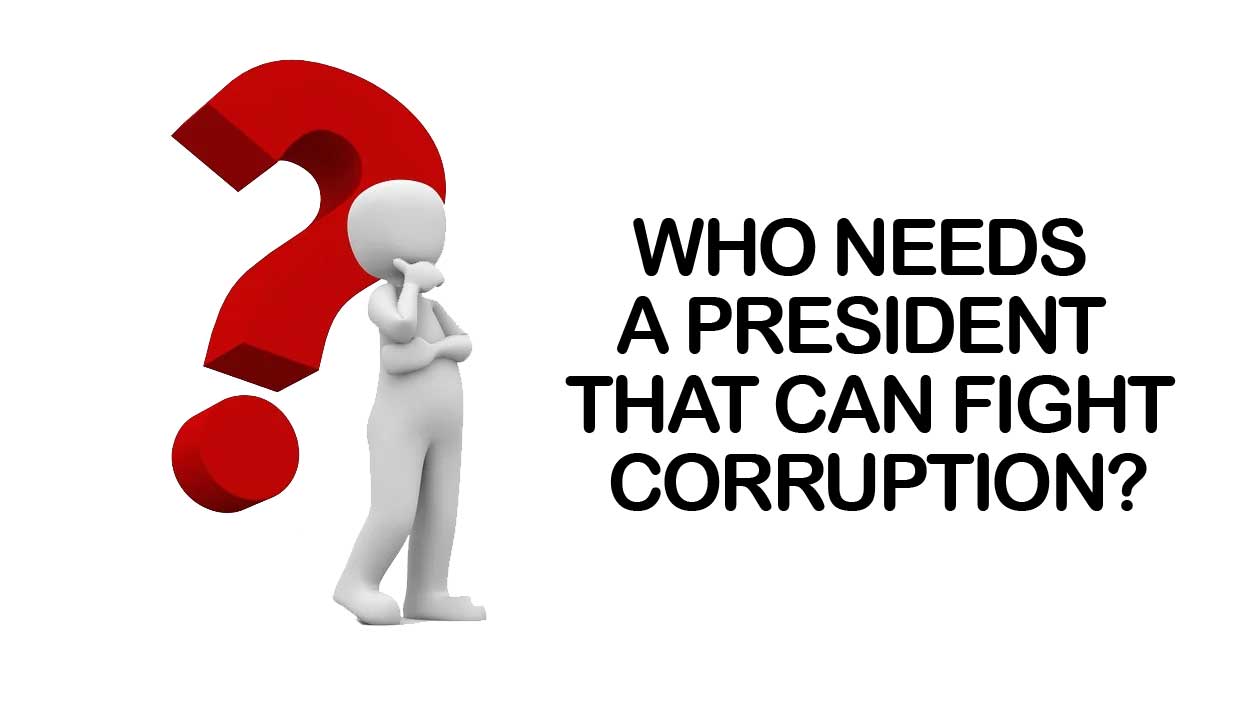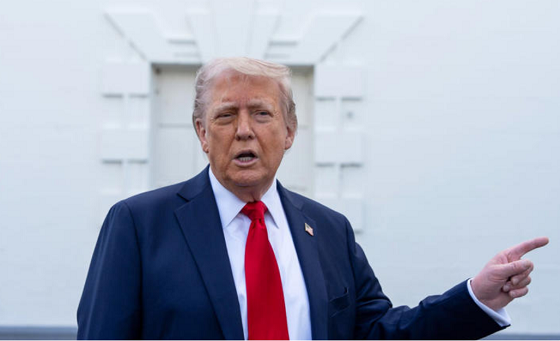Post Published on February 7, 2024 by Anthony Ekata
WHO NEEDS A PRESIDENT THAT CAN FIGHT CORRUPTION?
I don’t know whether we know how idiotic it sounds when people keep chorusing that Nigeria needs a president that can fight corruption. I do know, however, that people in saner climes would be laughing at us for seeking someone to teach us what we already know. I am certain that they would laugh when they hear that we are seeking a toughie to teach us how to queue up in public places. They would surely laugh when they hear that we need a disciplinarian to teach us the kindergarten lesson that it is wrong to throw litter onto the highway from a moving vehicle, or to block the drainage the government has spent huge sums of money to construct, or to connect illegally to the electricity grid or by-pass our metres (if we have any) so we do not pay electricity bills. I know they would deride the very essence of our quest because by the grace of God and the benevolence of men, I have traversed at least a dozen countries, including some tiny African states where you do not need a traffic warden to compel you to stop your car at a zebra crossing for an elderly man with a walking stick to cross the road. I lived and worked for 9 years in a country where you do not need anyone to remind you that playing your music too loud in a residential complex is being inconsiderate to your neighbours. But what do we have in Nigeria? Or is it possible we do not even know what corruption is? If this is so, how then do we intend to defeat an enemy we do not understand under a commander who is perhaps even more ignorant of the true nature of the enemy or the depth of its bunker?
What is corruption?
There are very many interesting definitions of corruption. Understanding the subject would be facilitated by understanding the manifestations and extent of corruption. According to Transparency International, “Corruption is the abuse of entrusted power for private gain. It hurts everyone who depends on the integrity of people in a position of authority.”
Did I hear you shout, “I said so!”? Slow down. The definition does not end there. It goes on to provide synonyms (equivalents) of corruption. These include dishonesty, dishonest dealings, unscrupulousness, deceit, deception, duplicity, double dealing, fraud, fraudulence, misconduct, lawbreaking, crime, criminality, delinquency, wrongdoing, villainy, etc. The Free Merriam Webster dictionary defines corruption as “impairment of integrity, virtue or moral principle: depravity”.
In fact, Vocabulary.com clarifies it even further. It states that “The noun corruption comes from Latin –com, or “with, together” and rumpere, meaning “to break.” Corruption breaks your trustworthiness, your reputation…,” it adds. Antigraft.org, in trying to put in perspective the extent of corruption in Nigeria states: “The reality of corruption in Nigeria is that it is a wall-to-wall phenomenon, blanketing and smouldering every aspect of the country’s socio-economic life. But in spite of its centrality to the nation’s political life and its ubiquity in all other social transactions, it is, perhaps by design, consensus or ignorance a spectral presence, lacking the necessary mass to permit a forceful and physical engagement. Nigerians have been unable or unwilling to put a name to the various strains of corruption; with the result being that for most, corruption is a generic proposition ….”
Now, enough of grammar. Let’s zero in on one of the simple equivalents of corruption – misconduct and lay it beside common sense. Do we need someone to teach us that it is wrong (a misconduct) to pooh or wee in the kitchen instead of the toilet? Do we need someone to teach an elder that it is wrong to sleep with his son’s wife? Do we need anyone to teach a man not to batter his own wife? Is it not impairment of integrity, virtue or moral principle, villainy and duplicity for a man accused of any of these misconducts to accuse another of corruption?
In Nigeria, some doctors working in public hospitals divert equipment and supplies to their private clinics and spend more of their paid hours in those clinics when they are not on strike; government officials dilly-dally with issues of the welfare of doctors and sometimes divert the funds meant for such; thereby precipitating industrial actions; retired office holders set up commercial empires far above the standard of any that they built (if they built any) while in office; pastors build private schools and universities with proceeds from church activities and set school fees that the poor members of their congregations cannot afford. What do the people do? They keep on shouting Hallelujah!
The docility of the people, the lack of necessary mass to permit a forceful and physical engagement with the disciples of corruption is perhaps the greatest ingredient fertilizing the scourge. Consider the hue and cry over the purported depletion of the nation’s Excess Crude Account. A state governor came out to explain that it was shared among the tiers of government and, indeed, it was. But what did the recipients do with their share? Most of them went back to their bases to share their share among a few ‘key’ figures and associates at the expense of projects that would benefit the people. The people begin to complain but the complaints are motivated less by altruism but more by bitterness because they are not beneficiaries of the sharing. When it was announced that Nigeria had become the largest economy in Africa owing to the rebasing of her GDP, the prompt repost of most was, ‘What is the use of being the largest economy when it does not impact positively on the life of the common man?’ I think the right question should be, ‘Why is it not positively impacting the life of the common man’? The answer is simple. It is because the common man apparently has no common sense. A privileged few corner the fruits of economic growth and the common people in their usual siddon-look manner keep quiet. When they do not keep quiet, they clap for these highly placed rogues for being ‘smart’ and scorn those in similar positions who mumuishly refuse to dip their hands into public coffers. In worse scenarios, the common people troop to ceremonies where these known looters of public funds are being decorated with ludicrous chieftaincy titles to ‘enjoy’.
A man comes into public office as a pauper. He was driving one help-me-push jalopy when he was (s)elected as a representative of your constituency in the National or State Assembly. Within two years, he marries a new wife, buys new cars for his wives, builds a hotel and drives around town in the latest SUV. You know very well that 20 years’ salaries and allowances cannot afford half of these. Yet, when he visits home (mostly during festivals) you troop to his country home, usually the best in the locality, to give him twale or rankadede. Instead of asking him what he is doing with your constituency’s vote, you are asking, “Anything for the boys?” He gives you some change, you hail him some more and go and drink shekpe with the pittance he has used to remove your curse from his head. As soon as he departs for the capital city, you join others to be shouting, “Our president is clueless. He is a weakling. He is not bold enough to face the corrupt people in his government”. I hear you! Now, hear me; if we were all bold enough to face the corrupt people in our midst, tell them off, scorn them rather than worship them, corruption would abate, and the president would have time to attend to more pressing issues.
I find it ridiculous (I don’t know about you) when I come across posts on Facebook saying that CHANGE is coming, and all corrupt people should buy mattresses with which to sleep in jail. My question is, where are the jailhouses and where will they get enough mattresses to buy? If that is the priority of the incoming government, then we should all be ready to suffer because the government will be so busy building prison yards that there will be no time or money left to do any other thing. Besides, this is a democracy. What I think we should be clamouring for is for whichever government that comes in to strengthen the democratic institutions; the legislature, the judiciary, and the civil service. Pay workers living wages and stop treating them as civil SERVANTS. Servants are compelled to steal from their masters to assuage their ill-treatment. Educate the youth to know their left from their right, teach them skills that would make them employers and not employees and when their hands are not idle, the devil (the godfather of corruption) will be out of business.
It is perhaps instructive to recall that when General Muhammadu Buhari seized power 30 years ago, he declared war on corruption which manifested in all spheres of society as indiscipline. I am sure that was why he did not coin his crusade War Against Corruption but War Against Indiscipline. I was a 21-year-old Youth Corper in Kazaure, Jigawa State (then part of Kano State) and President Jonathan was just a young graduate then. Tell me, was it Jonathan that caused the corruption, alias indiscipline that Buhari fought? This is only to show how ingrained corruption is in our society and not to exonerate Jonathan from culpability. The reality today is that Dr Goodluck Ebele Jonathan is in the saddle, and people rightly expect that he should do something about it. And they are right! You do not allow the sore on your child’s body to fester because it was not caused by you.
But then again, when that sore has gone very bad, you need someone to help you hold your child down when you are pressing it with hot water otherwise your child would run away. In some cases, when your child knows that the hot water on the fire is to press his sore, he runs away and if he goes to hide in a neigbour’s house, the neighbour, irrespective of political affiliation, either forces the child or lures him back home to his father. That was my experience because I did have some wicked sores sustained while playing soccer with some ‘ruffians’ even after I had been advised by my parents not to do so. Whereas it is very important that the father makes a conscious effort to prevent the child’s wound from degenerating, it is even more important for the child to obey instructions and avoid situations that would lead to injury.
If corruption was an easy nut to crack, Buhari and all subsequent generals who inhabited Aso Rock would have smashed it to pieces, and Obasanjo would not have found it necessary to set up the EFCC. Even Obasanjo, with all his bravado, did not (could not?) prosecute or cause to be prosecuted the widely perceived corrupt arrowheads of his administration who are still today gallivanting shamelessly from one political party to another – an act that is in itself corruption within the ambit of our definitions, as it borders on impairment of integrity, virtue or moral principle.
Yes, corruption in high places; the wanton abuse of entrusted power for private gain, is evil and reprehensible, but it would only be conquerable if the common people are not gullible, but sensible enough to condemn and shun it in all its manifestations. The people should make a conscious effort to choose right over wrong and teach their children to do so. The truth is that no one person anywhere in the world can fight and win the war against corruption. It is a task for all. None of us is better than all of us.
From Random Thoughts: A Collection of Essays & Poems by Tony Ekata
First published January 11, 2015, on newsplus.ng.com







